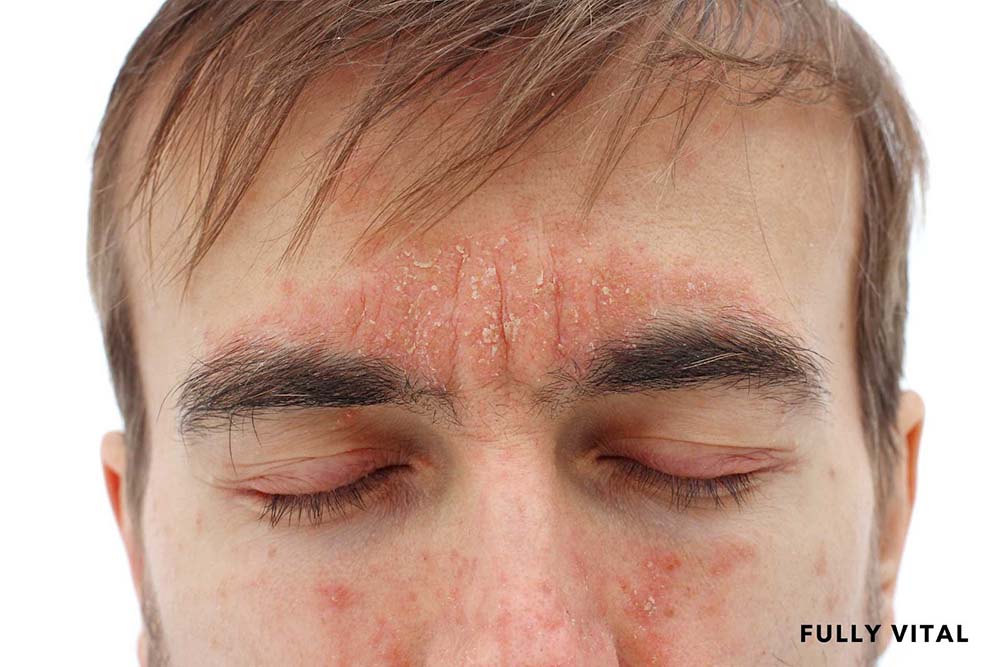
Discoid Lupus Erythematosus: Understanding Its Impact On Hair Growth
Welcome to our blog where we aim to cover all things relevant to hair growth for women of all hair types.
In this article, we will delve into the topic of Discoid Lupus Erythematosus, an important condition that can affect hair health and overall well-being.
Let's get started with some essential information about this condition.

I LOVE MY HAIR NOW
FullyVital hair serum and hair vitamins made tremendous improvements in my hair. I truly love my hair now.
Dorit S.,
What Is Discoid Lupus Erythematosus?
Discoid Lupus Erythematosus (DLE) is a chronic autoimmune skin disease that predominantly affects the skin, particularly in areas exposed to sunlight.
It is a form of cutaneous lupus, which means it primarily involves the skin, rather than affecting internal organs.
The condition gets its name from the characteristic "discoid" shape of the skin lesions that often appear on the face, ears, and scalp.

Why Is Awareness Of Discoid Lupus Erythematosus Important?
Awareness of Discoid Lupus Erythematosus is crucial for several reasons.
Firstly, early detection and diagnosis are essential for managing the condition effectively.1
By recognizing the symptoms early on, individuals can seek medical attention and prevent further complications.
Additionally, raising awareness helps reduce misunderstandings and stigmas associated with autoimmune disorders, fostering a supportive community for those affected.
How Does Discoid Lupus Erythematosus Work?
Discoid Lupus Erythematosus occurs when the body's immune system mistakenly attacks healthy skin cells, causing inflammation and skin damage.
The exact cause of this autoimmune reaction is not fully understood, but genetic predisposition and environmental factors, such as ultraviolet (UV) light exposure, may play a role in triggering the condition.
What Are The Causes Of Discoid Lupus Erythematosus?
While the exact causes of Discoid Lupus Erythematosus remain unclear, researchers believe that a combination of genetic, hormonal, and environmental factors contribute to its development.2
Some potential triggers include a family history of autoimmune diseases, exposure to UV light, certain medications, and hormonal imbalances.
Are There Any Downsides To Discoid Lupus Erythematosus?
Discoid Lupus Erythematosus can have various adverse effects on affected individuals.
Apart from the physical symptoms like skin rashes and scarring, the emotional toll of managing a chronic condition can also impact a person's mental well-being.3
Additionally, some medications used to treat DLE may have side effects.
It is important to work closely with healthcare professionals to find the most suitable treatment plan.
What Is The History Of Discoid Lupus Erythematosus?
The history of Discoid Lupus Erythematosus (DLE) dates back several decades, and understanding its past can provide valuable insights into the development of treatments and management strategies.
Here's an overview of its historical aspects:
Early Observations
DLE was first described in medical literature in the mid-19th century when physicians noticed the distinct skin lesions.
Nomenclature And Classification
The term "discoid lupus erythematosus" was coined in the early 20th century to differentiate it from other forms of lupus.
Advancements In Diagnosis
Over the years, medical advancements, including skin biopsy techniques, have improved the accuracy of DLE diagnosis.
Treatment Evolution
Treatment options have evolved from topical ointments to immunosuppressive medications, enhancing patient care and symptom management.
What Is The Current Environment Of Discoid Lupus Erythematosus?
Understanding the current environment surrounding Discoid Lupus Erythematosus (DLE) is essential for staying up-to-date with advancements and challenges in managing the condition.
Here's an overview of the current landscape:
Present State of DLE Management:
Medical Research
Ongoing research efforts continue to deepen our understanding of DLE's pathophysiology and potential targeted therapies.
Patient Support
Online communities and patient support groups provide valuable resources and a sense of community for individuals living with DLE.
Dermatological Care
Dermatologists play a crucial role in diagnosing and managing DLE, ensuring patients receive appropriate treatment and follow-up care.
What Is The Future Of Discoid Lupus Erythematosus?
As medical knowledge and technology progress, the future of Discoid Lupus Erythematosus (DLE) holds promise for improved patient outcomes and enhanced quality of life.
Here's a glimpse of what the future may hold:
Potential Advancements on the Horizon:
Personalized Treatments
Advancements in precision medicine may lead to individualized treatment plans tailored to each patient's unique needs.
Biologics And Immunotherapy
Researchers are exploring the potential of biologics and immunotherapy agents to target specific aspects of DLE's immune response.
Digital Health Solutions
Technological innovations, such as wearable devices and telemedicine, may facilitate remote monitoring and timely interventions.
Can Stress Trigger Or Worsen Discoid Lupus Erythematosus Flare-Ups?
Stress can indeed play a significant role in triggering or worsening Discoid Lupus Erythematosus (DLE) flare-ups.
The relationship between stress and autoimmune diseases like DLE is complex and not fully understood, but it is believed that stress can impact the immune system and contribute to inflammation.
Here's what you need to know:
How Stress Affects DLE:
-
Stress can lead to an overactive immune response, which may worsen the symptoms of DLE.
-
Emotional stress may trigger hormonal changes that can influence the immune system's functioning.
Managing Stress to Reduce Flare-ups:
-
Practicing stress-relief techniques such as meditation, yoga, or deep breathing can help manage stress levels.
-
Engaging in regular physical activity and maintaining a healthy lifestyle can also positively impact stress management and overall well-being.
What Are The Common Early Signs And Symptoms Of Discoid Lupus Erythematosus?
Early detection of Discoid Lupus Erythematosus is crucial for timely management and treatment.
Recognizing the early signs and symptoms can prompt individuals to seek medical attention promptly.
Here are some common early indicators of DLE:
Common Early Signs and Symptoms:
Skin Lesions
Circular or oval-shaped red, raised patches on the skin, often with scaling or crust formation.
Hair Loss
Thinning or hair loss in areas affected by the skin lesions, particularly on the scalp.
Photosensitivity
Increased sensitivity to sunlight, leading to skin rashes after sun exposure.
Itchiness And Pain
Affected skin may be itchy, and some individuals may experience mild pain or discomfort.
How Is Discoid Lupus Erythematosus Different From Systemic Lupus Erythematosus (SLE)?
Discoid Lupus Erythematosus (DLE) and Systemic Lupus Erythematosus (SLE) are two forms of lupus, but they have distinct characteristics and affect the body differently.
It's essential to understand the differences between the two:
Discoid Lupus Erythematosus (DLE):
-
Primarily affects the skin, resulting in characteristic discoid-shaped skin lesions.
-
Generally, it does not involve major organs or internal systems.
-
Hair loss is a common symptom, especially on the scalp.
Systemic Lupus Erythematosus (SLE):
-
Affects multiple organs and systems in the body, including joints, kidneys, and the nervous system.
-
Symptoms can be more severe and may vary widely among individuals.
-
Fatigue, joint pain, fever, and skin rashes are common symptoms.
Are There Any Specific Shampoos Or Hair Care Products Recommended For Individuals With DLE?
Choosing the right hair care products is essential for individuals with Discoid Lupus Erythematosus (DLE) to maintain scalp health and minimize irritation.
Consider the following tips when selecting hair care products:
Recommended Hair Care Products for DLE:
-
Mild and Sulfate-Free Shampoos: Sulfate-free shampoos are gentle on the scalp and help avoid further irritation.
-
Products with Sunscreen Properties: Hair care products containing UV protection can shield the scalp from sun exposure.
-
Avoiding Harsh Chemicals: Products with harsh chemicals or potential allergens should be avoided to prevent skin reactions.
Can Lifestyle Changes, Such As Diet And Exercise, Help Manage Discoid Lupus Erythematosus Symptoms?
Adopting a healthy lifestyle can complement medical treatment and contribute to managing Discoid Lupus Erythematosus (DLE) symptoms.
While lifestyle changes cannot cure DLE, they may help improve overall well-being.
Here are some considerations:
Lifestyle Changes to Consider:
-
Balanced Diet: A diet rich in antioxidants, vitamins, and omega-3 fatty acids may support immune function and skin health.
-
Regular Exercise: Physical activity can help reduce stress, improve mood, and promote overall health.
-
Avoiding Triggers: Identifying and avoiding triggers, such as excessive sun exposure, can help prevent flare-ups.
Unlock the Secret to Youthful Hair with Fully Vital's Hair Growth Products!Discover the power of science-backed hair growth solutions that can transform your locks and revitalize your confidence. At Fully Vital, we understand the importance of a healthy relationship with your hair, which is why we offer a variety of specialized products designed to stop the aging process and promote luxurious, vibrant hair. Key Features:
Join the Fully Vital community today and unlock the secret to timeless, vibrant hair! |
Final Thoughts On Discoid Lupus Erythematosus
Understanding Discoid Lupus Erythematosus (DLE) and its impact on hair growth is essential for women of all hair types seeking to maintain a healthy relationship with their locks.
By raising awareness about this chronic autoimmune skin condition, we aim to empower individuals with knowledge and support their journey to vibrant hair health.
Through this comprehensive guide, we have explored the ins and outs of DLE – from its early signs and symptoms to potential triggers and management strategies.
We have also delved into the historical aspects, the current landscape, and the exciting potential of future advancements in DLE research and treatment.
At Fully Vital, we are committed to providing you with a range of hair growth products that cater to your specific needs.
Our carefully curated selection aims to combat the aging effects on your hair, helping you embrace the beauty of your locks with confidence and vitality.
Frequently Asked Questions About Discoid Lupus Erythematosus
Can Discoid Lupus Erythematosus lead to hair loss?
Yes, in some cases, DLE can cause hair loss, particularly if the lesions affect the scalp and hair follicles.
Is Discoid Lupus Erythematosus contagious?
No, DLE is not contagious. It is an autoimmune disorder and cannot be transmitted from person to person.
How is Discoid Lupus Erythematosus diagnosed?
Diagnosis is typically based on physical examination, medical history, and a skin biopsy of the affected area.
Can stress worsen Discoid Lupus Erythematosus symptoms?
While stress may not directly cause DLE, it can potentially exacerbate symptoms and trigger flare-ups in some individuals.
Is there a cure for Discoid Lupus Erythematosus?
Currently, there is no cure for DLE, but with proper management, symptoms can be controlled effectively.
Can hair growth products worsen Discoid Lupus Erythematosus?
Some hair growth products may contain ingredients that could trigger skin irritation or sensitivity in individuals with DLE.
It's essential to consult with a dermatologist before using such products.
What are the best ways to protect the skin from sun exposure with Discoid Lupus Erythematosus?
To protect the skin, individuals with DLE should use broad-spectrum sunscreen, wear protective clothing, and avoid prolonged sun exposure, especially during peak hours.
Can hormonal changes affect Discoid Lupus Erythematosus symptoms?
Yes, hormonal changes, such as those during pregnancy or menopause, may impact DLE symptoms and flare-ups.
Are there any natural remedies for managing Discoid Lupus Erythematosus symptoms?
While natural remedies may offer some relief, they should be used with caution and under the guidance of a healthcare professional to avoid potential interactions with medications.
Is it safe to use hair dyes with Discoid Lupus Erythematosus?
Some hair dyes may contain chemicals that could trigger skin reactions in individuals with DLE.
It's advisable to do a patch test before using any new hair products and opt for hypoallergenic alternatives.
What are the other types of scarring alopecia?
The other types of scarring alopecia include frontal fibrosing alopecia, central centrifugal cicatricial alopecia and lichen planopilaris.
Source:
-
Maidhof, W., & Hilas, O. (2012). Lupus: an overview of the disease and management options. P & T : A Peer-Reviewed Journal for Formulary Management, 37(4), 240–249.
-
Maidhof, W., & Hilas, O. (2012). Lupus: an overview of the disease and management options. P & T : A Peer-Reviewed Journal for Formulary Management, 37(4), 240–249.
-
McDaniel, B., Sukumaran, S., & Tanner, L. S. (2020). Discoid Lupus Erythematosus. PubMed; StatPearls Publishing. https://www.ncbi.nlm.nih.gov/books/NBK493145/






